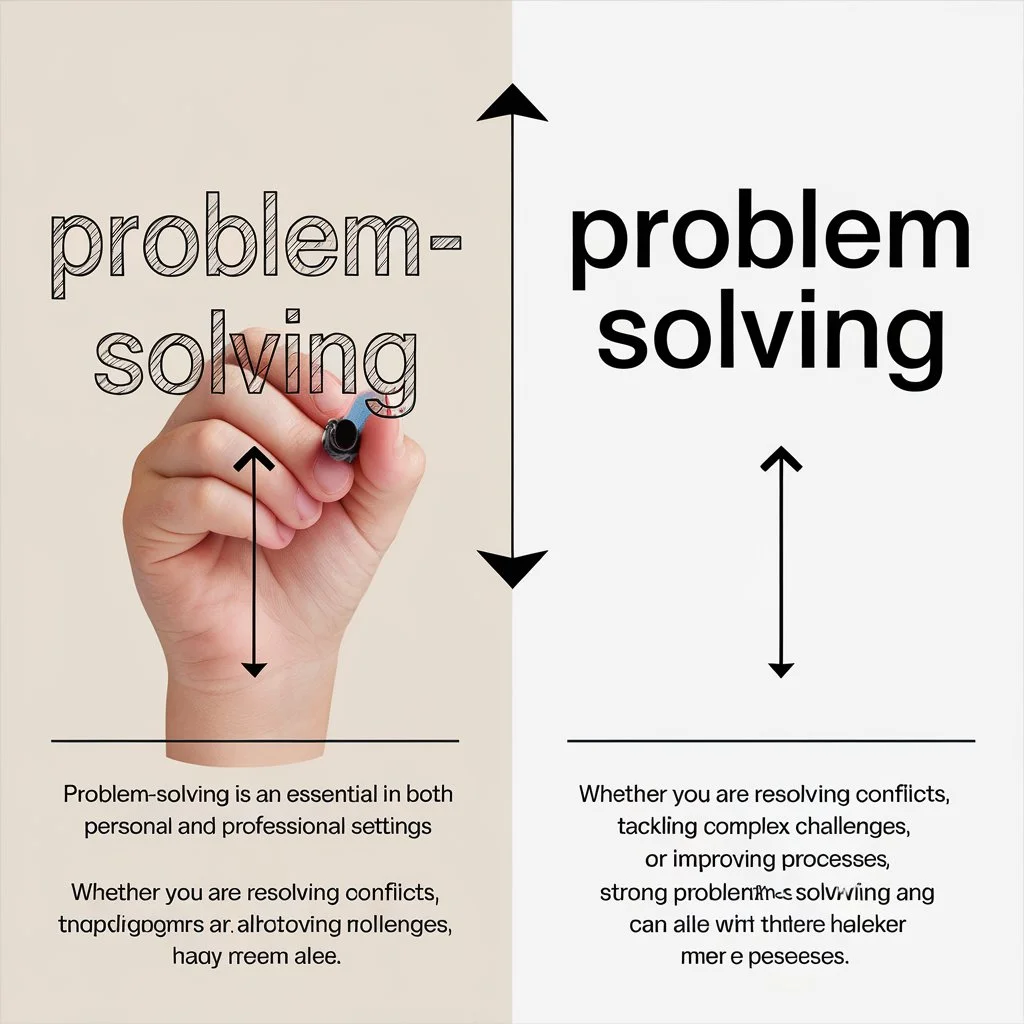Problem-solving is an essential skill in both personal and professional settings. Whether you are resolving conflicts, tackling complex challenges, or improving processes, strong problem-solving abilities are highly valued. The hyphenation of problem-solving can sometimes be confusing, but it follows specific rules depending on how it is used in a sentence. Understanding when to hyphenate problem-solving can make your writing clearer and more precise. In this guide, we will explore when to use problem-solving with and without a hyphen, as well as some helpful alternatives.
Hyphenation rules can be confusing, especially when you’re first learning a language. However, once you understand the basics, you’ll find that they’re not as complicated as they might seem.
Problem-Solving or Problem Solving – Which is Correct?
When it comes to the use of problem-solving, the rule is simple: problem-solving is hyphenated when it’s used to modify a noun or object in a sentence. On the other hand, problem solving (without a hyphen) is used when the phrase acts as a noun on its own, not modifying anything else.
Examples of When to Use Problem-Solving
Now that we’ve discussed the differences, let’s go through some examples of how to use problem-solving (with a hyphen) in sentences. As mentioned earlier, problem-solving is used when it modifies a noun or object. It’s the most common form, and in modern usage, even the non-hyphenated version is becoming less popular.
- This is a problem-solving class.
- I hold a problem-solving position at my workplace.
- My manager put me in charge of the problem-solving accounts.
- They say I have a problem-solving mind.
- We’re known as problem-solving children.
- She excels in problem-solving tasks at her company.
- The problem-solving approach helped the team resolve issues quickly.
- This is a problem-solving workshop designed to enhance critical thinking.
- We use a problem-solving model to address complex challenges.
- His problem-solving skills impressed the hiring committee.
- The school implemented a problem-solving curriculum to teach students analytical thinking.
- My supervisor praised my problem-solving ability during the meeting.
- She was promoted to a problem-solving role in the technical department.
- The software includes several problem-solving tools to assist users.
- Their problem-solving strategies were effective in managing the crisis.
- A good leader needs strong problem-solving capabilities.
- They attended a problem-solving seminar to improve collaboration.
- Her problem-solving techniques helped reduce production delays.
- The team used a problem-solving framework to handle customer complaints.
- He developed a unique problem-solving method to overcome technical barriers.
Examples of When to Use Problem Solving
Although much less common, problem solving (without the hyphen) is still grammatically correct when used as a phrase noun, usually appearing at the end of a sentence or clause. However, as noted earlier, the hyphenated form is becoming more widely accepted and used.
- I’m good at problem solving.
- This requires a lot of problem solving.
- We are all trained in problem solving.
- My job asks for problem solving.
- Did you say you were good at problem solving?
- I’m really good at problem solving under pressure.
- She enjoys problem solving and often helps her colleagues with complex tasks.
- Problem solving is an essential skill in this industry.
- They focused on problem solving during the training session.
- His job involves a lot of problem solving every day.
- Problem solving requires patience and creativity.
- We practiced problem solving exercises in the workshop.
- She has a natural talent for problem solving.
- The project will require some intensive problem solving.
- He took a course on effective problem solving techniques.
- Problem solving helped them overcome the challenges they faced.
- The meeting was dedicated to group problem solving.
- Our team excels in collaborative problem solving.
- She uses logical reasoning in her problem solving process.
- We need to improve our problem solving to meet the deadline.
Is “Problem-Solving” Hyphenated in AP Style?
Yes, it is! If you’ve reviewed the AP Stylebook, you’ll notice that it provides clear guidelines on when to use hyphens. The hyphen is used to connect words that modify a noun or object in a sentence, helping to ensure clarity. So, in AP Style, problem-solving is hyphenated when used as an adjective.
Examples
- The problem-solving team addressed the issue quickly.
- She was recognized for her problem-solving efforts in the project.
- A problem-solving approach is critical in customer service.
- The company values employees with strong problem-solving skills.
- We attended a problem-solving seminar last weekend.
- His problem-solving attitude helped resolve the conflict.
- A problem-solving mindset is key to success in this role.
- They developed a problem-solving tool to improve efficiency.
- The problem-solving techniques we learned were effective.
- Their problem-solving abilities were tested during the crisis.
- A problem-solving exercise was included in the interview process.
- The problem-solving strategies outlined in the manual were helpful.
- We used a problem-solving framework to handle the challenges.
- Her problem-solving capacity made her a valuable asset to the team.
- The new hire excelled in problem-solving scenarios during training.
Should I Capitalize “Solving” in “Problem-Solving”?
When it comes to capitalization in titles, the answer depends on the style you are following. There are three main approaches:
- Capitalize only the first word: In this case, neither “problem” nor “solving” would be capitalized unless they start the title.
- Example: We attended a class on problem-solving.
- Capitalize all major words except short conjunctions, prepositions, and articles: Here, “problem” is capitalized, but “solving” is not.
- Example: The Guide to Problem-Solving.
- Capitalize every word in the title: In this style, you capitalize both “Problem” and “Solving.”
- Example: An Introduction to Problem-Solving.
Does the Rule Apply to “Problem Solver” vs. “Problem-Solver”?
The same hyphenation rule applies when we use “problem solver” instead of “problem solving.” That is, you’ll use problem-solver with a hyphen when it modifies a noun or object. However, you’ll more commonly see “problem solver” without a hyphen, as it typically doesn’t act as a modifier.
Alternatives to “Problem-Solving”
If you’re still unsure about using problem-solving or problem solving, you can opt for alternative words that convey the same meaning without requiring a hyphen. Some great alternatives include:
- Analytic
- Detailed
- Diagnostic
- Interpretive
- Rational
Quiz – Problem-Solving or Problem Solving?
Now, let’s test what you’ve learned with a quick quiz! Choose whether the sentence requires problem-solving (hyphenated) or problem solving (not hyphenated).
- I’ve been told that I’m good at (A. problem-solving / B. problem solving).
- I hold my (A. problem-solving / B. problem solving) skills close to my heart.
- We aren’t great at (A. problem-solving / B. problem solving).
- These are all the best (A. problem-solving / B. problem solving) subjects.
- Can we have a go at a (A. problem-solving / B. problem solving) puzzle?
Quiz Answers
- B – problem solving
- A – problem-solving
- B – problem solving
- A – problem-solving
- A – problem-solving
FAQs
What is problem-solving?
Problem-solving is the process of identifying a problem and coming up with ways to fix it. It involves using logical thinking, creativity, and sometimes teamwork to reach a solution. In many jobs, strong problem-solving skills are important for handling challenges or unexpected issues. Good problem-solving can improve efficiency and help achieve goals faster.
When should I use “problem-solving” with a hyphen?
Use problem-solving with a hyphen when the phrase is used to describe or modify a noun. For example, in sentences like “problem-solving techniques” or “problem-solving mindset,” the hyphen links the two words to show that they act together as a single idea describing the noun. This hyphenated form is used when problem-solving is an adjective in a sentence.
Can “problem solving” be used without a hyphen?
Yes, problem solving without a hyphen is used when the phrase is a noun on its own. For example, in “He’s great at problem solving,” it’s acting as the subject of the sentence. When problem solving is not describing another word, it doesn’t need a hyphen. This form is used less often but is still grammatically correct.
Is “problem-solving” hyphenated in AP Style?
Yes, in AP Style, problem-solving is hyphenated when it functions as an adjective describing a noun. For example, in a sentence like “She led the problem-solving session,” the hyphen connects the two words to clarify their function as a modifier. AP Style recommends using hyphens in compound adjectives like this to ensure clarity for readers.
What are some alternatives to “problem-solving”?
Some alternatives to problem-solving include terms like analytical thinking, rational thinking, critical thinking, or troubleshooting. These words refer to different methods of addressing and resolving challenges or issues. Each of these alternatives highlights specific approaches to understanding and solving problems effectively, and they can be used to avoid overusing the term problem-solving.
Final words
In conclusion, understanding when to use problem-solving with or without a hyphen can significantly improve clarity in your writing. Using problem-solving as a hyphenated adjective helps modify and describe specific nouns, while problem solving without a hyphen works as a standalone noun. By mastering these simple rules, you enhance your communication, especially in professional and academic settings. Developing strong problem-solving skills and knowing how to express them effectively is key to success in many areas of life.

I’m Mira Sinclair, the expert helping you navigate grammar sections at “Grammer Grove.” Playing with words and expressions is my thing. At Grammer Grove, we’re here to make yourwriting stand out and shine. Let’s make your appreciation heartfelt and memorable—come and join the fun at Grammer Grove!












